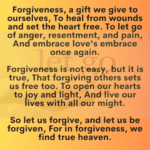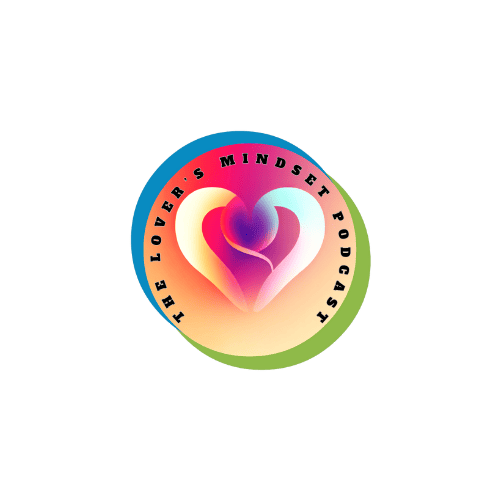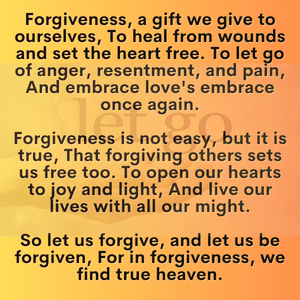
Hey there, Leo Bastien here, and welcome to another episode of “The Lover’s Mindset.” Today, we’re diving deep into a topic that’s both profound and transformative: What does forgiveness really mean?
By understanding what forgiveness really means, we can use it in the correct way to live a more happy and peaceful life as well as enter other levels of love. So, buckle up, dear listeners, as we embark on a journey to unravel the layers of forgiveness and its impact on our relationships.
1: What is Forgiveness?
Let’s dive into the essence of forgiveness. To forgive is not a mere utterance of the words “I forgive you.” It’s a profound inner shift. Forgiveness is a conscious decision to release the hold of resentment, judgment, and anger, allowing the possibility of healing to enter our lives. It’s not about condoning actions; it’s about liberating ourselves from the chains of negative emotions that are derived from the untruths we have been indoctrinated with in our society.
2: The Healing Power of Forgiveness
Picture this: holding onto grudges is like carrying a backpack filled with stones. It weighs us down, affecting not only our emotional well-being but also the dynamics of our relationships. True forgiveness is the art of unburdening ourselves, creating space for love to flourish. When Love increases, we become happier, more joyous, and more at peace. That is healing. I am sure you have heard the saying that love heals everything.
3: Self-Forgiveness
Ah, but here’s the twist—forgiveness isn’t just about others. It starts with ourselves. Self-forgiveness is the cornerstone of a healthy mindset. How can we extend grace to others if we are unable to forgive our own shortcomings?
Love is often associated with compassion, and this compassion should extend inwardly as well. Self-forgiveness involves treating oneself with the same kindness and understanding that one would offer to a beloved. It means being gentle with one’s own heart, especially in moments of self-reflection.
But most importantly, self-forgiveness is truly about correcting the errors of the mind. What I mean by that is, we have been indoctrinated with many untruths about ourselves. We are now getting to understand how powerful our minds are at creating.
You know all the negative thoughts that go on in your head which allows your ego to utilize those thoughts to cause you to believe that blaming another for your miscreation is the way to go.
Doing a self-forgiveness practice will help you to understand love more intimately but also to know and inner-stand how powerful your mind and consciousness are. As a result of this inner-standing, you become more aware of your egoic thoughts and you start to step into your Divine power of creation in a more focused way.
4: How to Navigate Hurt
Let’s address the elephant in the room—what about those deep hurts that feel impossible to forgive? It’s a journey, not a destination. We will explore strategies to navigate the web of pain and emerge with a heart open to forgiveness.
Getting hurt in a relationship is a painful experience. It can be difficult to know how to navigate these feelings, especially from the lover’s mindset perspective. Here are a few practical tips:
- Allow yourself to feel your emotions. Don’t try to suppress your hurt or pretend that you’re not upset. It’s important to allow yourself to feel your emotions fully to heal.
- Communicate with your partner. Once you’ve had time to process your emotions, it’s important to communicate with your partner about what happened and how you’re feeling. Be honest and open about your needs.
- Seek support from others. Talking to a trusted friend or therapist can help you to process your feelings and develop coping mechanisms.
- Take care of yourself. Make sure you’re getting enough sleep, eating healthy foods, and exercising regularly. Taking care of yourself physically and emotionally will help you to heal more quickly.
- Set boundaries. If you need some time and space to heal, that’s okay. It’s important to set boundaries with your partner and respect your own needs.
Here are some specific examples of how to implement these tips:
- Allow yourself to feel your emotions: If you’re feeling sad, cry. If you’re feeling angry, write in a journal or talk to a trusted friend. Don’t try to bottle up your emotions.
- Communicate with your partner: Say something like, “I’m really feeling hurt by what you said. Can we talk about it?” Be honest and open about your needs.
- Seek support from others: Talk to a trusted friend or therapist about what happened and how you’re feeling. They can offer support and guidance as you heal.
- Take care of yourself: Make sure you’re getting enough sleep, eating healthy foods, and exercising regularly. Taking care of yourself physically and emotionally will help you to heal more quickly.
- Set boundaries: If you need some time and space to heal, that’s okay. Say something like, “I need some time to process what happened. Can we talk about it next week?”
Navigating hurt in a relationship is not easy, but it is possible. By following the tips above, you can start to heal and move forward. Remember, you are worthy of love and respect.
5: Rebuilding Trust
How To Rebuild Trust From The Lover’s Mindset
Trust is the foundation of any healthy relationship. But when trust is broken, it can be difficult to repair. If you’re trying to rebuild trust with your lover, here are a few practical tips from the lover’s mindset perspective:
- Acknowledge and apologize for your mistake. The first step to rebuilding trust is to acknowledge and apologize for your mistake. Be sincere and specific in your apology. Let your lover know that you understand the pain you caused them and that you are truly sorry.
- Be honest and transparent. Once you’ve apologized, it’s important to be honest and transparent with your lover. This means sharing your thoughts and feelings openly and honestly. It also means being accountable for your actions and keeping your promises.
- Give your lover time and space. Rebuilding trust takes time. Don’t expect your lover to forgive you overnight. Be patient and give them the time and space they need to heal.
- Be consistent in your actions. The best way to show your lover that you’re committed to rebuilding trust is to be consistent in your actions. This means following through on your promises and doing things that show your lover that you care about them.
- Be willing to forgive yourself. It’s also important to forgive yourself for your mistake. This doesn’t mean that you should condone what you did, but it does mean letting go of the guilt and shame associated with your mistake.
Here are some specific examples of how to implement these tips:
- Acknowledge and apologize for your mistake: “I’m so sorry for lying to you about where I was last night. I know that broke your trust, and I promise that I will never do it again.”
- Be honest and transparent: “I’m feeling really insecure about our relationship right now. I’m worried that you don’t love me anymore.”
- Give your lover time and space: “I know you’re still hurting from what I did. I need you to know that I’m here for you when you’re ready to talk.”
- Be consistent in your actions: “I know I have a lot to prove to you, but I promise that I’m committed to rebuilding our trust. I will be honest with you, and I will always keep my promises.”
- Be willing to forgive yourself: “I know that I made a mistake, but I’m not a bad person. I’m going to learn from my mistake and move on.”
Conclusion
Rebuilding trust takes time and effort, but it is possible. By following the tips above, you can start to rebuild trust with your lover and create a stronger and more resilient relationship.
.
The Ripple Effect of Forgiveness
The beauty of forgiveness lies in its ripple effect. When we choose to forgive, we create a positive impact not only in our lives but also in the lives of those around us. It’s a transformative act that radiates love and compassion, fostering a culture of understanding and empathy. As we forgive, we contribute to a world where kindness prevails. Your forgiveness is the salvation of the world.
CONCLUSION
So, dear listeners, as we wrap up today’s episode, let’s reflect on the true meaning of forgiveness. It’s a gift we give ourselves and others, a balm for the wounds of the heart and mind. Remember, in the vast tapestry of love, forgiveness is the thread that binds us all and takes us to higher levels of Love.
Thanks for joining me on this episode of “The Lover’s Mindset.” Until next time, keep spreading love, practicing forgiveness, and embracing the beauty of every step in this journey called life. Thank you for being more forgiving. Peace, love, happiness, and light to you all. Namaste.


Leave a Reply